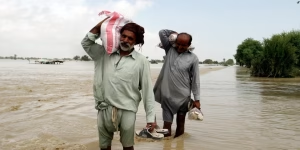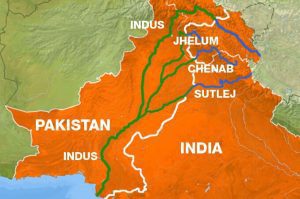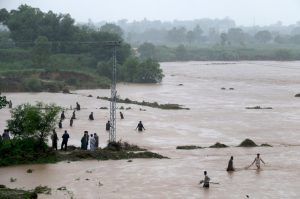New Delhi – Pakistan’s ongoing flood crisis has taken an unexpected turn with Defense Minister Khawaja Muhammad Asif making controversial statements about cross-border water flow from India. The Khawaja Asif Dead Bodies In Water Claim has emerged during one of Pakistan’s most severe flooding disasters, affecting over one million people across multiple provinces.
The Controversial Khawaja Asif Dead Bodies In Water Claim

During a visit to flood-affected areas in Sialkot, Defense Minister Khawaja Asif made startling allegations against India regarding the source of floodwater contamination. The Khawaja Asif Dead Bodies In Water Claim specifically alleged that floodwaters flowing from across the Indian border carried corpses, livestock, and debris into Pakistani territory.
According to the minister’s statements, the Khawaja Asif Dead Bodies In Water Claim was based on local reports from residents who witnessed bodies being swept across the border. Asif emphasized that Sialkot lies downstream from water channels originating in Jammu and regularly experiences flooding when water is released from the Indian side.
Local Impact of the Khawaja Asif Dead Bodies In Water Claim

The defense minister elaborated on the Khawaja Asif Dead Bodies In Water Claim by explaining how the alleged contamination hampered municipal teams’ efforts to drain water from affected regions. He stated that the presence of corpses and debris made rescue and relief operations significantly more challenging for local authorities.
The Khawaja Asif Dead Bodies In Water Claim also highlighted the geographical vulnerability of Sialkot, which frequently bears the brunt of cross-border water flow during monsoon seasons. Local residents reportedly corroborated aspects of the minister’s statements regarding debris and contamination in floodwaters.
Public Reaction to Khawaja Asif Dead Bodies In Water Claim
The Khawaja Asif Dead Bodies In Water Claim has triggered widespread criticism and ridicule across Pakistani social media platforms. Citizens accused the defense minister of deflecting attention from government failures in infrastructure development and flood preparedness through these controversial statements.
Many Pakistani social media users viewed the Khawaja Asif Dead Bodies In Water Claim as an attempt to blame external factors for domestic policy shortcomings. Critics argued that such allegations during a humanitarian crisis reflected poorly on the government’s crisis management priorities and communication strategy.
Water Sharing Arrangements and the Claim


Despite the Khawaja Asif Dead Bodies In Water Claim, the minister acknowledged that India had informed Pakistan twice before releasing water into rivers. This admission contradicts typical accusations of unilateral action and suggests some level of coordination between the two countries despite ongoing tensions.
The Khawaja Asif Dead Bodies In Water Claim occurs against the backdrop of suspended bilateral cooperation under the Indus Waters Treaty. India halted the treaty following the deadly Pahalgam terror attack on April 22, resulting in no hydrological data exchange through any mechanism, including the Indus Commission.
Also Read: Shocking Minneapolis Shooter Message; Attack That Claimed 2 Lives
India’s Flood Warning Despite Tensions
Interestingly, the Khawaja Asif Dead Bodies In Water Claim comes after India recently shared information about severe weather and possible heavy flooding with Pakistan. This information sharing demonstrated concern for “public safety” as several cross-border rivers remained in spate, showing humanitarian considerations transcending political disputes.
The Khawaja Asif Dead Bodies In Water Claim thus presents a complex diplomatic scenario where humanitarian cooperation continues despite suspended formal water-sharing agreements and controversial allegations from Pakistani officials.
Devastating Scale of Pakistan’s Flood Crisis


Beyond the Khawaja Asif Dead Bodies In Water Claim, the actual flood crisis has displaced nearly 250,000 people across Pakistan. More than one million people have been affected by the floods, with crops and businesses destroyed and many unable to leave their homes.
Marriyum Aurangzeb, senior minister of Punjab province, reported that floods hit 1,432 villages located along the Ravi, Sutlej, and Chenab rivers, affecting approximately 1.2 million people and displacing 248,000 others. The scale of displacement makes the Khawaja Asif Dead Bodies In Water Claim appear even more controversial given urgent humanitarian needs.
Historic Flooding Patterns
According to the provincial irrigation department, this marks the first time in 38 years that the Ravi, Sutlej, and Chenab rivers have simultaneously experienced high flood conditions in Pakistan. This historic flooding pattern adds context to the Khawaja Asif Dead Bodies In Water Claim and the unprecedented challenges facing rescue operations.
The simultaneous flooding of these major rivers has forced rescue workers to intensify operations across multiple districts, stretching resources and complicating relief efforts beyond the scope of typical seasonal flooding.
Relief Operations and Government Response
Pakistani authorities have established nearly 700 relief camps and 265 medical camps in flood-affected areas, delivering food and essential supplies to displaced populations. The focus on practical relief efforts contrasts sharply with the political nature of the Khawaja Asif Dead Bodies In Water Claim.
Since late June, floods have killed more than 800 people across Pakistan, making this one of the country’s most deadly natural disasters in recent years. The magnitude of human suffering raises questions about the appropriateness of making unsubstantiated claims during such a critical humanitarian crisis.
Conclusion: Political Claims Amid Humanitarian Crisis
The Khawaja Asif Dead Bodies In Water Claim represents a troubling intersection of political blame-shifting and humanitarian crisis management. While Pakistan faces genuine challenges from devastating floods affecting over one million people, controversial statements from senior officials risk undermining both domestic credibility and international cooperation efforts essential for effective disaster response and long-term flood management solutions.

